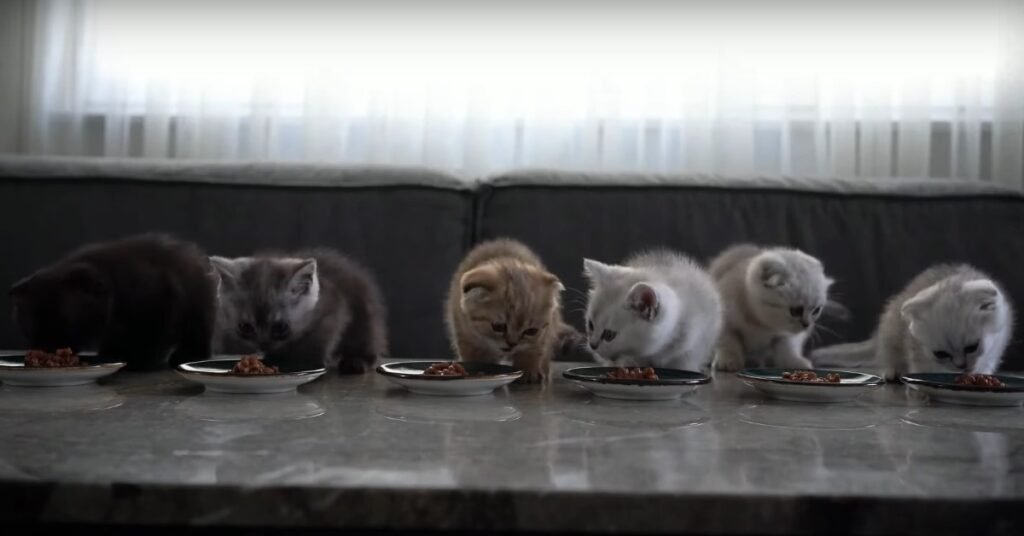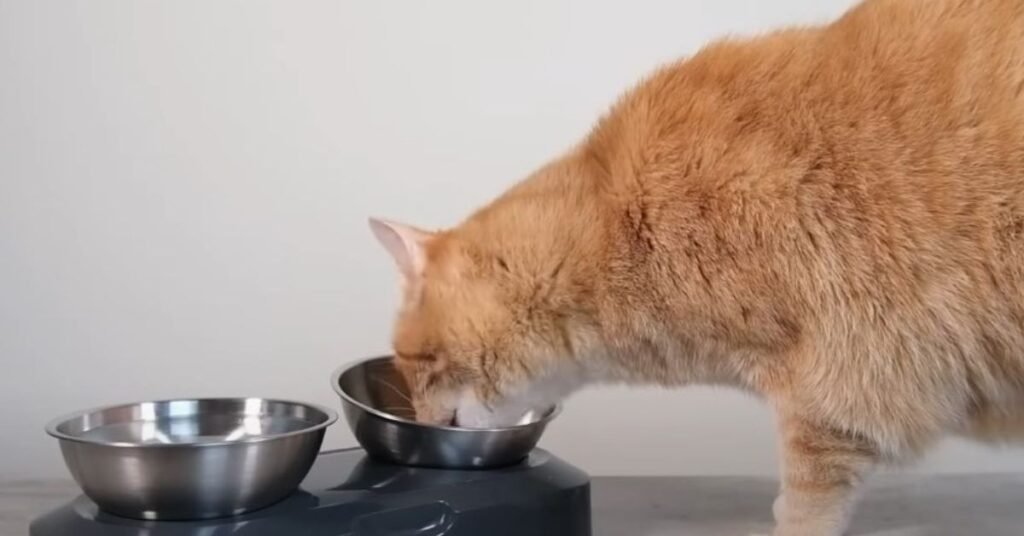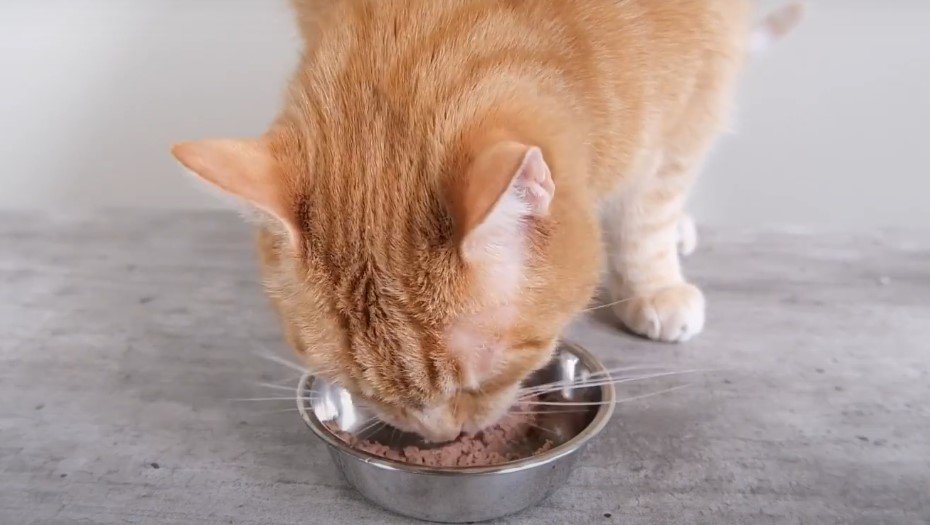
Is your senior cat struggling to maintain its weight? Many pet owners face this concern as aging cats lose their appetite or experience health issues.
Senior cats often face health problems such as chronic kidney disease (CKD) and hyperthyroidism, both of which are significant contributors to weight loss.
If you’re searching for solutions to help your senior cat gain weight, keep reading, as we’ll explore practical strategies to ensure your aging feline gets the nutrition it needs.
From dietary adjustments to understanding underlying health concerns, learn how to help your senior cat gain weight and stay healthy.
Why Won’t My Senior Cat Eat?
Senior cats often stop eating for various reasons. Here are some common ones:
Changes in the surroundings
Cats are sensitive to changes such as moving to a new home, new furniture, or adding another pet. Such disturbances might cause stress and a lack of appetite.
Illness
Dental pain, kidney disease, or digestive issues can make eating uncomfortable for senior cats. Regular vet check-ups are essential to identify and address these health issues
Mental Problems
Depression and anxiety can influence your cat’s eating habits. This might happen if they feel ignored or experience a lack of excitement in their environment.
Vaccination
Vaccinations might cause temporary side effects such as nausea, making your cat unwilling to eat. This usually resolves within a day or two.
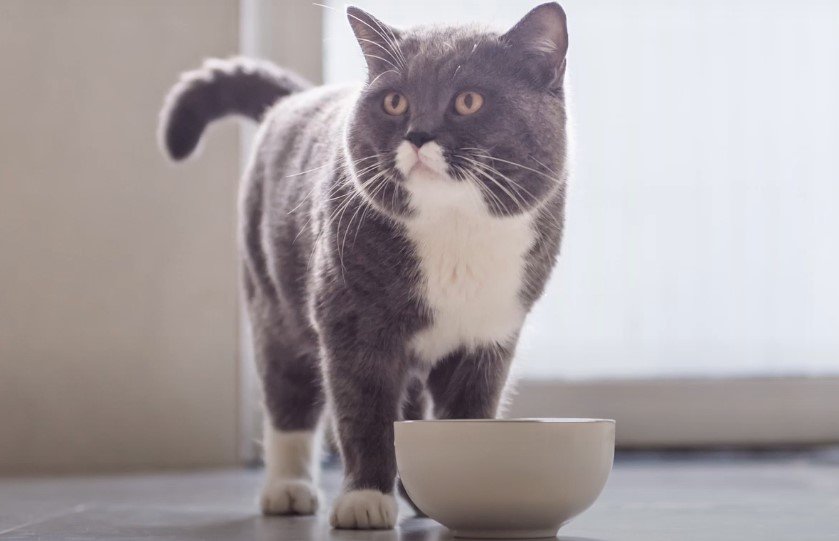
Why is my older cat losing weight?
Weight loss in elderly cats can result from various health issues, so it is crucial to identify the cause early. Below are 12 common reasons why your senior cat is losing weight:
Dental Issues:
Cats lose teeth as they age, and dental issues like gum disease or tooth pain can make eating difficult, causing them to avoid food.
Viral Disease:
Illnesses such as feline leukemia virus (FeLV) and feline immunodeficiency virus (FIV) can reduce appetite and cause weight loss.
Dysfunctional Digestive System:
A declining digestive system can affect nutrient absorption, leading to unexpected weight loss.
Chronic Kidney Disease (CKD):
CKD is a common condition in senior cats that often causes appetite loss, nausea, and weight loss.
Joint and Muscle Problems:
Arthritis or muscle wasting can make movement painful, reducing your cat’s activity and appetite.
Diabetes:
Uncontrolled diabetes increases appetite but causes weight loss as the body cannot properly process nutrients.
Hyperthyroidism:
This condition increases metabolism, causing weight loss despite an increased appetite.
Intestinal parasites:
Parasites such as worms can consume your cat’s nutrients, causing weight loss.
Cancer:
Some cancers cause weight loss due to decreased appetite, metabolic changes, or nutrient absorption issues.
Skin and Coat Issues:
Poor skin and coat health may indicate nutritional deficiencies contributing to weight loss.
Psychological Issues:
Stress, anxiety, or depression can reduce a cat’s appetite, causing weight loss over time.
Normal Aging:
As cats age, their metabolism slows, and they normally lose muscle mass and weight.
Other Symptoms to Consider
- Organ failure
- Gastrointestinal disorders
- Lower digestibility of fats and protein
- Enteropathies
- Dysbiosis
- Hypocobalaminemia (low vitamin B12)
How To Help a Senior Cat Gain Weight
Senior cats may have challenges maintaining a healthy weight for various reasons. Helping them gain weight requires a targeted strategy to meet their nutritional needs. Here’s a straightforward guide to the best feeding methods and advice for senior cats.
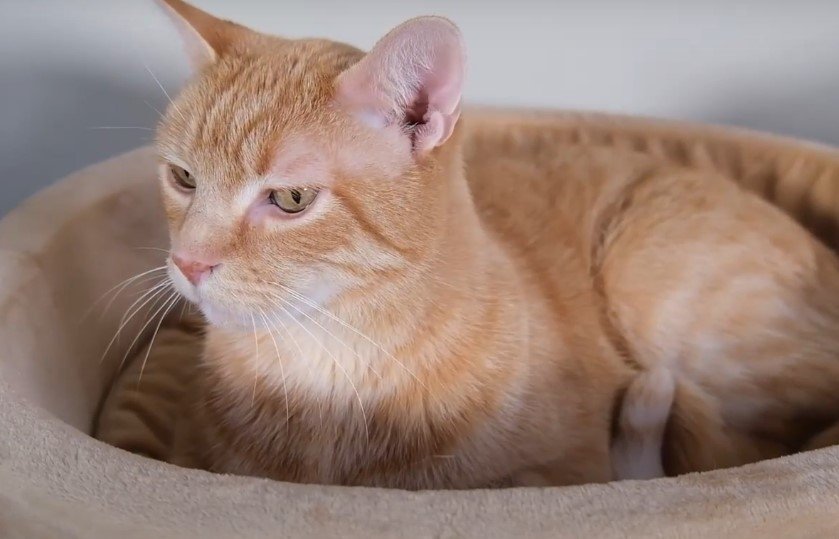
What to Feed an Old Cat to Gain Weight? 7 Essential Foods and Tips
High-Calorie Content
Choose a high-calorie cat food specifically developed to help elderly cats gain weight. Choose products labeled “for weight gain” or “high energy” to ensure they contain essential nutrients without unnecessary fillers.
Canned Wet Food
Wet food is softer and more digestible for older cats, especially those with dental issues. Its strong aroma and tender consistency make it appealing, especially to cats with smaller appetites.
Diet Supplements for Senior Cats
Nutritional supplements, such as appetite stimulants and vitamin mixes, can help older cats meet their nutritional demands. Omega-3 fatty acids, which boost nutritional absorption, and probiotics, which improve digestion.
Specialized or Prescription Diets
Cats with medical illnesses may need prescription diets designed to manage specific health issues. These diets are designed to support treatment while promoting a healthy weight.
Homemade Treats
Offer your senior cat nutrient-dense homemade cat food to stimulate appetite. Simple options include cooked chicken, fish, or a blend of cat-safe ingredients, providing healthy, calorie-rich supplements.
Prebiotics, Fiber & Fatty Acids
Prebiotics, fiber, and fatty acids all play an important role in supporting gut health and overall wellness. They improve digestion, allowing your cat to absorb nutrients more efficiently from their food.
Smaller and More Frequent Portions
Feeding older cats smaller meals many times a day boosts digestion and helps them consume enough calories to meet their nutritional requirements.
Tips to Help a Senior Cat Gain Weight
Reduce Stress: Create a peaceful environment and follow a consistent feeding schedule to reduce stress and increase appetite.
Veterinary Consultation: Consult a veterinarian to identify and treat any underlying health problems that may be causing weight loss. They can also recommend the best diet for your older cat’s requirements.
Warm up their wet food: Heating your cat’s wet food slightly might improve the aroma and make it more appealing. Make sure it isn’t too hot before serving.
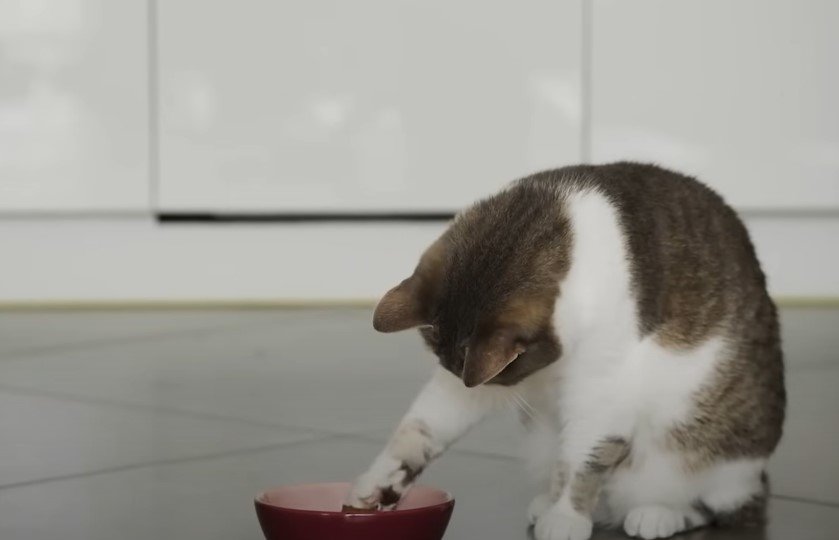
Supplements and high-calorie toppers for weight gain
High-Calorie Supplements
High-calorie supplements for senior cats to gain weight are typically veterinarian-prescribed and come in various forms, including gels, pastes, and powders. These supplements are designed to provide extra energy and nutrients to help cats struggling to maintain a healthy weight.
Benefits: These supplements often include vitamins, minerals, and essential fatty acids to support overall health and weight gain.
High-Calorie Toppers
What Are High-Calorie Toppers?
Toppers are flavorful additions to your cat’s normal food. They increase the calorie content and make meals more appealing.
Types of Toppers:
- Wet food or gravy-based toppers.
- Freeze-dried meat crumbles.
- Cooked fish or chicken bits (unsalted and unseasoned).
Benefits: Toppers can increase your cat’s interest in eating and provide a nutrient boost with each meal.
Things to Keep in Mind
- Vet Approval: It’s crucial to consult with your veterinarian before using any supplements, as they can help determine the best option for your cat’s specific needs and health conditions.
- Moderation: While these products are helpful, excessive use can lead to overfeeding or imbalanced nutrition.
Is it normal for older cats to get skinny?
As cats age, it’s common for them to lose weight. They may normally lose weight due to muscle mass loss, reduced appetite, difficulty digesting nutrients, and metabolic changes. Health issues like hyperthyroidism, kidney disease, diabetes, or dental problems can also lead to weight loss.
If your senior cat is getting skinny, consult a veterinarian to identify and address the underlying cause. Early treatment can help manage the issue and improve your cat’s quality of life.
How to tell if your cat is underweight
To check if your cat is underweight:
- Feel their ribs: If your cat’s ribs are easily felt or visible without much fat covering, your cat may be underweight.
- Check their waist: Look from above; an underweight cat will have a notably narrow waist.
- View from the side: If their belly appears tucked in rather than rounded, it may suggest a low weight.
- Observe their behavior: Lethargy, loss of appetite, and visible bones are all warning signs.
- Consult a vet: A veterinarian can confirm their weight and diagnose any underlying health problems.

Feeding techniques: Calculate How Much to Feed Your Cat
Feeding your cat the right amount is crucial for their health and well-being. The right amount of food depends on various factors, including age, weight, activity level, and whether she is pregnant or nursing.
Daily Caloric Requirements
Adult cats: Adult cats require approximately 20-30 calories per pound of body weight each day.
For example:
An 8-pound cat normally requires 160-240 calories per day.
A 10-pound cat may require around 200-300 calories per day, depending on activity levels.
Kittens: Kittens need more energy because of their growth needs.
Up to 6 months, they may require 2-3 times the calorie consumption of an adult cat.
This amounts to about 1/4 to 1/3 cup of dry food or 2.5 to 3.5 ounces of wet food daily.
Feeding Amounts Depend on Food Type
Wet Food: On average, an adult cat needs about 300 grams of wet food daily, however, this might vary depending on the calorie content. For example:
A typical wet food can contain around 95 kcal, so a cat needing 346 kcal / day would need about 3.64 cans per day.
Dry food: Dry food has more calories than wet food, so cats need less of it:
A healthy adult cat may require around 1/3 cup (40-60 g) of dry food daily.
Frequency of feeding
Kittens should be fed five times a day until they are approximately six months old.
Adult cats should be fed twice a day (morning and evening).
Consider individual factors such as breed, metabolism, and health issues.
Senior Cat Considerations:
- Determine Caloric Needs: Senior cats generally need around 20 calories per pound of body weight daily. A 10-pound senior cat may require 180-220 calories, depending on their activity and health.
- Frequent Small Meals: Split their daily calorie intake into 3-5 smaller meals to make eating easier and more appealing.
- Monitor Progress: Regularly weigh your cat and adjust portions if needed. If they’re not gaining weight, slightly increase their caloric intake.
How to weigh your cat at home?
Weighing your cat at home can be a straightforward process, and there are several ways you can use to ensure accurate results. Here’s how to do it properly:
Methods to Weigh Your Cat at Home
Using a Bathroom Scale
- Weigh Yourself: Start by weighing yourself using a digital scale and record your weight first.
- Weigh Yourself Holding Your Cat: Pick up your cat, step back on the scale, and record the total weight.
- Calculate: To determine your cat’s weight, subtract your weight from the total weight.
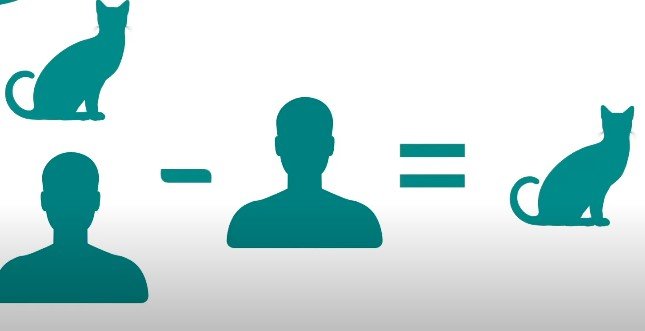
Example: If you weigh 150 pounds and together with your cat you weigh 156 pounds, your cat weighs 6 pounds.
Using a Cat Carrier
- Weigh the Empty Carrier: Place the carrier on a scale and record the weight.
- Weigh the Carrier with Your Cat: Put your cat in the carrier and record the total weight.
- Calculate: To find out how much your cat weighs, subtract the weight of the empty carrier from the total.
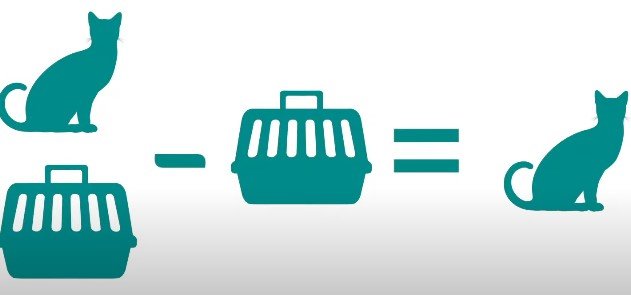
Using a Luggage Scale
- Prepare a bag: Place your cat into a soft bag or carrier.
- Weigh the Bag With Your Cat: Use the luggage scale to lift the bag and record the total weight.
- Weigh the empty bag alone
- Calculate: To determine your cat’s weight, subtract the weight of the empty bag from the total.
Does eating kitten food make an old cat gain weight?
Yes, feeding an old cat kitten food can cause weight gain. Kitten food is high in calories, fat, and protein, which is ideal for growing kittens but too rich for senior cats with slower metabolisms. If a senior cat is underweight or has trouble eating, kitten food may help.
Kitten food smells good and tastes delicious. So, many older cats sneaking into the kitten’s food. If they eat it for a long time, it can lead to obesity. Stop your older cats from eating kitten food to protect their health.
Conclusion
Helping a senior cat gain weight requires a balanced strategy that includes proper nutrition, vitamins, and the management of any health issues.
Following the tips in this article can help your cat regain a healthy weight.
If you want to know how to get an old cat to gain weight, focus on high-calorie, nutrient-dense diets, frequent meals, and a stress-free eating environment.
Always consult your veterinarian for specific guidance and regular check-ups to ensure your cat’s health.
FAQ:
1. How do I know if my senior cat is underweight?
Underweight cats often show visible signs, such as stretched ribs, spine, or hip bones. You may also notice a loss of muscle mass and energy levels. Your vet can check your cat’s weight and body condition to confirm if it’s underweight.
2. Can dry food help cats gain weight?
Dry food can help if it’s calorie-dense and designed for weight gain or senior cats. Choose high-protein, high-fat dry foods, and keep your cat hydrated with fresh water or wet food. If your cat has dental issues, softened dry food may be easier to eat.
3. What are the best high-calorie cat foods?
High-calorie foods include freeze-dried meat, cooked fish or chicken (unseasoned), or commercially available high-calorie cat foods. These should complement their main diet, not replace it. High-calorie foods should make up no more than 10% of your cat’s daily calorie intake.
4. What are the symptoms of kidney disease in older cats?
Symptoms of kidney disease in older cats include increased thirst and urination, weight loss, poor appetite, vomiting, nausea, lethargy, weakness, bad breath with a chemical smell, dehydration, and a dry coat.
5. Are appetite stimulants safe for senior cats?
Appetite stimulants can be effective but should only be used under veterinary supervision. Options like mirtazapine or cyproheptadine are commonly prescribed. These medications can help increase your cat’s appetite but must be part of a broader weight gain strategy that addresses the root cause of weight loss.
6. How do you know a cat is in pain?
A cat in pain might stop eating, hide, limp, meow differently, avoid being touched, or act grumpy. They might stop grooming or lick one spot too much.
